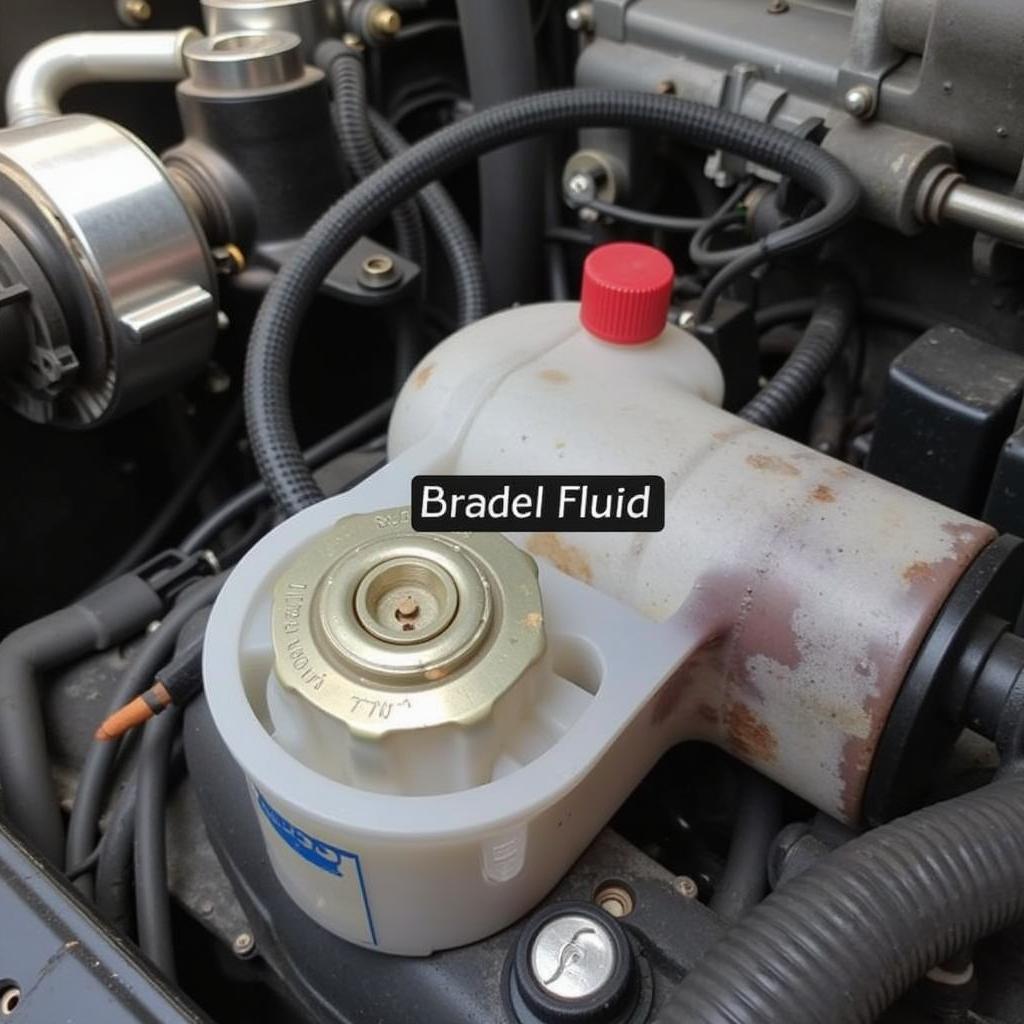The 2004 Maserati Coupe is a beautiful machine, but like any high-performance vehicle, it requires diligent maintenance. One common issue that owners may encounter is the dreaded brake warning light. This article will guide you through the process of diagnosing and potentially resolving a brake warning light issue on your 2004 Maserati Coupe, leveraging remote software diagnostics, programming, and installation when applicable. Understanding the “2004 maserati coupe brake warning light test” is crucial for maintaining optimal performance and safety.
Understanding Your Maserati’s Brake System
The braking system in your 2004 Maserati Coupe is a complex network of hydraulics, electronics, and mechanical components working together to provide safe and reliable stopping power. The brake warning light is designed to alert you to potential problems within this system. It can indicate anything from low brake fluid to more serious issues like worn brake pads or a malfunctioning ABS system. Ignoring this warning light can lead to costly repairs and potentially dangerous driving situations.
Possible Causes of the Brake Warning Light
Several factors can trigger the brake warning light in a 2004 Maserati Coupe. These include:
- Low Brake Fluid: This is the most common cause and often the easiest to fix. A leak in the brake lines or worn brake pads can lead to low fluid levels.
- Worn Brake Pads: As your brake pads wear down, the brake fluid level will drop. If the pads are excessively worn, the warning light will illuminate.
- Faulty Brake Sensor: The brake system uses sensors to monitor various components. A malfunctioning sensor can trigger the warning light even if there’s no actual problem.
- ABS Issues: Problems with the Anti-lock Braking System (ABS), such as a faulty sensor or pump, can also trigger the warning light.
- Parking Brake Engaged: Sometimes, the warning light can be triggered simply by leaving the parking brake engaged.
Performing a 2004 Maserati Coupe Brake Warning Light Test
Before jumping to conclusions, it’s important to perform a basic visual inspection. Check your brake fluid level, examine your brake pads for wear, and ensure the parking brake is fully disengaged.
-
Check the Brake Fluid Reservoir: Locate the brake fluid reservoir under the hood. The reservoir will have minimum and maximum level markings. If the fluid level is below the minimum mark, add the correct type of brake fluid as specified in your owner’s manual.
-
Inspect the Brake Pads: Visually inspect the brake pads through the wheel spokes. If the pads appear thin or worn, they likely need replacing.
-
Check the Parking Brake: Ensure the parking brake is fully released. Sometimes, even a slightly engaged parking brake can trigger the warning light.
Utilizing Remote Diagnostics and Software Solutions
If the visual inspection doesn’t reveal the cause, more advanced diagnostic tools might be necessary. Remote diagnostics and software solutions can often pinpoint the issue without requiring a physical trip to a mechanic. This involves connecting your car to specialized software that can read the car’s diagnostic trouble codes (DTCs) and identify the problem area. Sometimes, software updates or recalibrations can even resolve the issue remotely.
“Remote diagnostics have revolutionized the way we troubleshoot and repair modern vehicles, particularly for issues like intermittent brake warning lights,” says Michael DeLuca, Lead Automotive Diagnostic Technician at Prestige Auto Solutions. “It allows us to quickly pinpoint the root cause, often saving the customer time and money.”
When to Seek Professional Help
While some brake warning light issues can be resolved with basic troubleshooting, others require professional attention. If you’ve checked the fluid level, brake pads, and parking brake, and the light persists, it’s crucial to seek the help of a qualified mechanic specializing in Maserati vehicles. They have the expertise and equipment to diagnose and repair complex brake system problems.
Conclusion
Addressing a brake warning light on your 2004 Maserati Coupe requires a systematic approach. By understanding the potential causes and following the steps outlined in this “2004 maserati coupe brake warning light test” guide, you can often identify and resolve the issue. However, don’t hesitate to seek professional help if needed. Maintaining a healthy brake system is paramount for your safety and the longevity of your Maserati.
“Regular brake system maintenance is essential for any vehicle, but especially for high-performance cars like the Maserati Coupe,” adds DeLuca. “Preventative measures can save you from unexpected and potentially costly repairs down the line.”
FAQ
-
What should I do if my Maserati Coupe brake warning light comes on while driving?
Safely pull over to the side of the road and assess the situation. -
Can I drive my Maserati Coupe with the brake warning light on?
It is not recommended to drive with the brake warning light on. Have the vehicle inspected immediately. -
How often should I check my Maserati Coupe’s brake fluid level?
Check the brake fluid level at least once a month. -
What type of brake fluid does a 2004 Maserati Coupe use?
Consult your owner’s manual for the correct brake fluid type. -
How much does it cost to replace brake pads on a 2004 Maserati Coupe?
The cost varies depending on the type of brake pads and labor rates. -
Can I replace the brake pads on my Maserati Coupe myself?
If you have mechanical experience, you may be able to replace the brake pads yourself. However, it’s recommended to have this done by a qualified mechanic. -
How often should I have my Maserati Coupe’s brake system inspected professionally?
It’s recommended to have your brake system inspected annually or as recommended by your service schedule.

